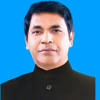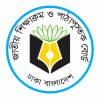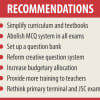MCQ and the Creative Question system
In a recent meeting at CIRDAP auditorium in Dhaka aiming to find ways to improve the quality of secondary education, the participants along with renowned academicians recommended the abolishment of the Multiple Choice Questions (MCQ) system in all examinations. According to a Daily Star report, almost all the participants said that students don't learn anything from it. If this is the case, then why have tests like IELTS, SAT, TOEFL, GRE, GMAT etc, that use MCQs, been recognised all over the world? Even in public examinations of our neighbouring countries like Sri Lanka, Philippines, Singapore, or even for admission tests of different universities, MCQs are widely used.
The participants also indicated that MCQs help students get higher marks through guesswork. What is the basis of this statement? Has any study been conducted? Have we ever checked the average of CQs and MCQs? Which one has the higher mean? We need to address these questions before making such comments.
There are broadly four aspects for which MCQs are considered effective assessment tools in examinations across the world. They are: content coverage, measuring Learning Outcomes (LOs) from simple to complex, ensuring marking reliability and ease of marking.
Content validity (representative questions from different lessons, thereby covering the content of the text) is imperative for a valid question paper. For example, a subject has 100 lessons. We can at best cover nine lessons using creative questions (in practical subjects, this becomes six). But if we use 40 MCQs along with 9 CQs, the whole question paper will have the maximum opporutnity to represent the content of the textbook.
A valid MCQ will compel students to go deep into a subject to answer the question. For example, if we consider the following question, we will see how complex LOs are assessed using MCQ.
Mr. Huda's mother left Bangladesh in 1969 for England and stayed there ever since, after marrying a British citizen. Mr. Huda is working in a multinational company in Bangladesh and is staying with his grandparents in Dhaka. He was not allowed to get enrolled as a voter when he tried to get registered in a voter list. Mr. Huda along with his friend Mr. Romit, a government officer, went to Iraq for a personal visit and was caught in war. The Bangladesh Government rescued only Romit, leaving Mr. Huda in Iraq.
Which one is a correct statement below?
(a) The Bangladesh Government did not discharge its responsibility for Huda properly
(b) The attitude of the Bangladesh Government towards Romit was biased
(c) It is obligatory by law for the Bangladesh Government to rescue Huda
(d) Steps taken by the Bangladesh Government for Romit was rational
The answer of the above question demands diversification of thought from students. In Civics, there is a chapter titled Citizenship. In that chapter it is mentioned that a Bangladeshi citizen who left Bangladesh before 1970 and stayed abroad since then would no longer be considered a Bangladeshi citizen. So, Mr. Huda is not a Bangladeshi citizen. But as he is staying in Bangladesh with his grandparents and has a job here, he could be a Bangladeshi citizen by virtue of approval. But as he is not allowed to be a voter, he might be a foreigner as foreigners are not allowed to be voters. It is also known that mostly insane people are not allowed to be voters. But as he is working in a multinational company, it denotes that he is not insane. As a result, it is certain that he is considered to be a foreigner.
Now a student has to choose whether Mr. Romit is a Bangladeshi or a foreigner. As per the law of Bangladesh, no foreigner can hold a government post. As it is clearly mentioned that Mr. Romit is a government officer, it shows that he is definitely a Bangladeshi citizen.
The Citizenship chapter talks of the rights of citizens, which a student has to consider while answering the question. One of the rights of a citizen is to get help from the state when he/she will be in danger in a foreign land. But a foreigner does not have this sort of right.
The student who will have the skill to analyse all the information of the text will be able to pick the fourth option as the correct answer. So, it is unwise to say that students don't learn anything from MCQs and is easy to get higher marks. Actually the problem lies elsewhere. It is not the fault of the MCQs. We need to address the actual problem.
Ensuring marking reliability is a big concern for us. But we can easily overcome this concern by using MCQs as there is no way to apply markers/examiners' own judgment while marking MCQs, as is the case with essay type questions. Apart from marking a script, having essay type questions is time consuming. But as MCQs are machine readable, within a few hours hundreds of scripts are marked with utmost reliability.
Considering the above advantages of MCQs, we should not abolish this system from examinations. Rather, we should follow the suggestion of our honourable Education Minister - reduce the number of MCQs and introduce other assessment tools along with MCQs.
Last but not the least, Professor Abdullah Abu Sayeed , a renowned educationist, criticised the high pass rate. This year, all examination boards' average pass rate in SSC examination has been 88 percent. What does the pass mark of 33 percent actually indicate? Ideally, it should be the 33 percent learning outcomes (LOs) of each subject. Is it irrational for most students to achieve at least 33 percent Los, after going through LOs of each subject for two years?
Professor Syeed also said that the main objective of an exam is to test one's merit. Don't we think that the present examination system test the merit of students, i.e. make a distinction between able and less able students? If that were not the case, then most of the students should have achieved GPA-5. But only 5.8 percent (on an average of all boards) students have achieved GPA 5 in this year's SSC examination. So, the number of most capable students is few in terms of the whole population. It denotes that the present examination system is able to make a distinction between able and less able students.
The writer is Senior Specialist, Examination and Evaluation, Bangladesh Examination Development Unit, SESIP, Board of Intermediate and Secondary Education.

 For all latest news, follow The Daily Star's Google News channel.
For all latest news, follow The Daily Star's Google News channel. 








Comments